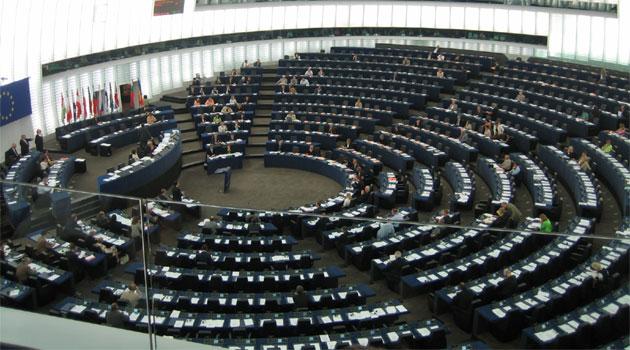Analysis: Czech Civic Democratic Party cracks the whip on the poor with yet another anti-Roma campaign

The most impoverished people who live in the Czech Republic may lose their aid benefit designed for those in material distress, including their housing benefit, for up to three months if they commit a misdemeanor three times in a row – such as disrupting nighttime quiet, petty theft, making threats or causing slight bodily harm. A bill to that effect by the Civic Democratic Party (ODS) has been approved by the lower house during the first of three readings and is currently being assessed by the Social Affairs Committee.
Cabinet members from the Association of Dissatisfied Citizens (ANO) and the Czech Social Democratic Party (ČSSD) have taken a neutral position on the scheme, despite the fact that the Government itself is expressing concern over a possible growth in the number of allegations of property-related crimes and misdemeanors should the bill become law. The executive has also warned that some people placed on probation could end up in such existential need that they would actually would be worse off than prisoners, whose basic needs are met by the state.
If ministers are aware of those facts, then a “neutral” stance on the bill is an alibi at the very least. However, as part of the coarse populism of Czech Prime Minister Babiš (ANO) and Czech Interior Minister Hamáček (ČSSD), which includes bloodthirsty xenophobia, such a stance is explicable.
Bad in principle and as a matter of pragmatism
The bill is bad in principle, even from a pragmatic perspective on this issue. Let’s take a look at why.
First: To deprive people who are eligible for such benefits of that aid contravenes human rights and the sense of humanity upon which our democracy is based. The first President of Czechoslovakia, Tomáš G. Masaryk, imprinted Czechoslovakia with exactly those principles as our founding ideal.
Masaryk was convinced that “democracy is ethical when it is justified as the political realization of love for one’s neighbor”. It is exactly social welfare benefits that aid our society with maintaining stability.
The opposite of that is to deprive somebody of benefits for which they are eligible – to abandon somebody to the condition of being absolutely without resources is, therefore, also an act of societal self-destruction. If we leave somebody who has no chance of earning money for three months without resources, it means such people will lose their housing because they will have no money for rent.
The “traffickers in poverty” running apartment rentals and residential hotels here enforce the collection of very high rents. Currently, tenants who have no jobs and draw welfare pay those high rents from their housing benefit.
However, the housing benefit in and of itself is rarely enough to cover the rent, so these people also use their subsistence benefits to cover the rent in full. The owners of the apartment units and residential hotels that are leased to impoverished tenants conclude short-term contracts with them, maybe even just for one month or three, and if the rent is not paid, the landlords throw the tenants out of the apartment unit or residential hotel room simply by not extending the contract.
This also means these impoverished people will either go hungry, or go steal – there is, therefore, an actual danger here that thanks to this bill, crime rates will go up and, as a consequence, a wave of hatred will again rise up against the impoverished, above all against Romani people living in ghettos. “Thanks” to the customary generalizations that apply here, however, all Romani people will become targets.
We experienced a permanent anti-Roma campaign of that sort roughly beginning in 2008, when the first attempted pogrom by neo-Nazis against Romani people happened, and it lasted until the so-called “refugee crisis” of 2015. During that time, in many corners of the Czech Republic, mobs of citizens led by ultra-right extremists were marching in the streets, attempting pogroms against the Roma, and shouting hateful, racist slogans at them – for example, “black swine”, “Gypsies to the gas chambers”, “Burn them all and bury them alive”, “Stab them in the back!” – under the lenient observation of both local and state police officers.
That possibility is being intensified by another part of the ODS bill: anybody convicted with final effect and placed on probation would also be deprived of welfare benefits for six months, while those waiting to serve their prison sentences would be deprived of such benefits for up to one year. That can only be comprehended as a direct incentive to the commission of even more crime.
Second: The ODS bill is not generally applicable to anybody who commits crimes or misdemeanors, but just concerns a certain group of people. Other people who do not collect welfare would be able to commit such crimes or misdemeanors without a local government or the state depriving them of the money necessary to their basic subsistence.
Those who are richer are, in such a case, at an advantage compared to those who are poorer, which means we would not all be equal before the law here. Imagine what would happen if somebody were to propose a law saying that billionaires and millionaires would lose all of the profits from their enterprises if they committed three misdemeanors?
Everybody would justifiably warn that legislation like that is incompatible with democracy. However, those who stand up for the impoverished are few and far between here, despite the fact that the principle on which they are to be singled out – their income – would be the same as the principle in our imaginary bill targeting millionaires.
Installing fear of the “enemy within”
We already have a system here in which it is possible to prosecute anybody who commits misdemeanors. Any fines assessed can already be taken out of the welfare benefits drawn by the most impoverished, so there is no reason to harden what is an already tough punishment.
Why is ODS proposing this, and why do most of the other political parties like it? It is probably not far from the truth to express the impression that this new method of repression is meant to return fear of the “enemy within” to the political game – and the Roma play the role of a time-tested “anti-partner” here.
Let’s recall the first such bill from ODS that was adopted here. “Thanks” to that law, authorities are able to ban somebody from residing on the territory of a municipal department or an entire town for up to three months if they are convicted of committing certain misdemeanors repeatedly: petty theft, disrupting nighttime quiet, or soliciting prostitution in a public space.
That bill was initiated by then-Czech MP Ivana Řápková (ODS), the former Mayor of Chomutov, and 101 MPs voted for it. Lawmakers from ODS, from TOP 09 – including the purported “champion of human rights” Miroslav Kalousek – the LIDEM (To the People) party and several MPs from “Public Affairs” (Věcí veřejných) were in favor of it (results of that vote are here).
That bill was adopted by the Chamber of Deputies in 2012. One year before that, ODS had also proposed, under Řápková’s direction, that social welfare benefits designated for subsistence be subject to collections – debtors would be left just the minimum amount of money necessary to existence, which back then was CZK 2020 [EUR 80] per month, for their food, clothing, and their children’s school supplies.
The years 2011 and 2012 were critical in terms of resistance to the “enemy within” (the Roma). At that time it was being decided whether the situation would calm down or grow into a storm.
Not just these ODS proposals, but also the other behavior of politicians, above all the populist ones, pushed society toward that storm. The Roma were intimidated by demonstrations against them, by bills targeting them, and by the racist, xenophobic slogans of populists across the political spectrum.
It is very likely that ODS and the other parties are playing exactly that game again today. The “enemy” from without – migrants and refugees – is no longer as attractive as it once was for distracting people, so the “enemy within” must come on board, rendered in the worst possible form. Why do politicians do this?
ODS is apparently not able to win more than 15 % of the electorate, TOP 09 may not make it into the lower house next time, the Communist Party of Bohemia and Moravia (KSČM) might not either, and ANO wants to preserve its high electoral support, not to mention the “Freedom and Direct Democracy” (SPD) party of Tomio Okamura, etc. – and campaigns along these lines are a time-tested aid for their problems if they manage to unleash the same hysteria against Romani people by the next elections as they did at the close of the last decade. Apparently we have a lot to look forward to here.
